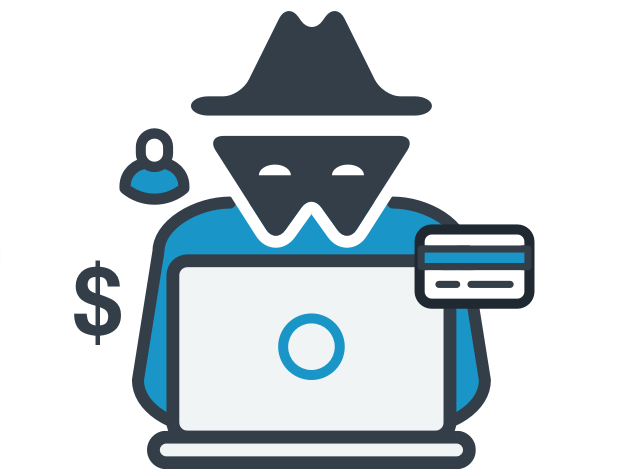Did you know, on average someone becomes a victim of identity theft every two seconds in the United States?
Identity theft occurs when someone uses your Personal Identifiable Information; such as your name, social security number, or birthdate to impersonate you. Identity thieves can use your stolen information to access bank or investment accounts, open new credit cards or loans in your name, have utility services turned on in your name, steal your tax refunds, and even give your information to law enforcement if they get arrested.
Your WWFCU Financial Gurus are here to help you get a better understanding of the different kinds of identity theft and potential warning signs to be on the lookout for. We will also provide you with the necessary steps you should take if you become a victim of identity theft. Such as information on how and where to report it, and how to protect yourself from being a victim in the future.
The most common types of identity theft include:
- Credit Identity Theft. Credit identity theft is when your stolen information is used by criminals to apply for new credit. Some warning signs to look out for include:
- Changes in your credit score or an account you don’t recognize.
- Debt collection notices, phone calls, or even judgments against you for unpaid debts.
This is why monitoring your credit report is so very important! Identifying and reporting discrepancies right away can keep the problem from escalating. The best way to prevent this type of identity theft in the future is to put an alert and/or freeze on your credit report so additional verification methods must be taken before a loan or credit line may be disbursed in your name.
-
- WWFCU offers free credit report monitoring products and free soft inquiry credit reports monthly. Click here for more information: FREE Identity Theft Protection (wwfcu.org)
- Taxpayer Identity Theft. Taxpayer identity theft is when someone uses your social security number to file a tax return with hopes of stealing your tax refund. Watch out for red flags such as:
- Not being able to e-file.
- Notices from the IRS suggesting you worked for an employer who is unknown to you and who you never worked for.
Filing your taxes early is one of the best ways to prevent this from happening to you. By filing early, you beat the criminals to the punch and stop them from stealing your tax return money.
-
- WWFCU partners with Love My Credit Union to offer our members discounts on tax filing products. Click here for more information: Love My Credit Union Rewards: Tax Services
- Criminal Identity Theft. Criminal identity theft happens when your information is given to law enforcement by a criminal during an arrest or investigation. Identity thieves may use your stolen information to create fake IDs, such as a driver’s license or state ID card. A warning sign to look out for would be:
- Receiving court appearance requests for tickets you were not involved in.
The negative effects of this type of identity theft could result in you being detained by a police officer for reasons you know nothing about or being denied a job or promotion due to something found in your background check.
- Child Identity Theft / Synthetic Identity Theft. Child/Synthetic identity theft involves stealing a child’s social security number, which is used to create a false identity with a blank slate. Reports show children may be victimized at a rate of between 35 to 51 times higher than adults. This type of crime often goes unnoticed for years, until the child applies for college loans or other credit in their name. Be on the lookout for warning signs including:
- Receiving credit card offers through the mail for your child.
- Calls regarding missed payments on a loan or credit card in the child’s name.
It is possible to prevent this happening to your child by shredding all confidential documents, keeping personal information private, or placing alerts and/or freezes on their credit reports.
-
- Take advantage of WWFCU’s credit report monitoring products and free soft inquiry credit reports monthly for your child as well as yourself. Click here for more information: FREE Identity Theft Protection (wwfcu.org)
- Medical Identity Theft. Medical identity theft is when someone uses your medical benefits to get health care services. This is a potentially dangerous type of identity theft because it mixes your medical history with that of the criminal and could affect health care decisions made by your doctor. Warning signs include:
- Claims or payments on your Explanation of Benefits you don’t recognize.
- Bills for services you didn’t receive.
- Changes to your deductibles and/or co-insurance payments.
If you have been a victim of medical identity theft, contact your insurance company and healthcare provider to ensure all your medical information is correct and dispute any services you did not authorize.
- Account Takeover. Account Takeover happens when cybercriminals use stolen information to hijack your online accounts. Once they have access, they can change your login info to lock you out, withdraw funds, make purchases, or extract information they can sell or use to access other accounts. Popular targets of account takeover include:
- Online bank or credit card accounts.
- Social media or email accounts.
- Online shopping accounts.
To protect yourself from account takeover:
-
- Create good password habits – use strong and unique passwords for each online account; avoid using common words or characters, recycled passwords, and previously exposed passwords. Try using a password manager to generate and/or store your passwords.
- Use Multifactor Authentication (MFA) – when available, take advantage of setting up security questions, enabling one-time verification codes sent via text or email, using biometrics such as fingerprints or face recognition, and/or using authentication apps such as Google Authenticator or Microsoft Authenticator.
- Pay attention to notifications and alerts – if you receive text messages, emails, or phone calls about account changes you did not initiate (such as changes to your password, email, address, phone number, etc.), investigate it right away.
- Monitor your account activity regularly – look for changes or transactions you don’t recognize and report any suspicious activity to the company or agency involved so they can secure your account immediately.
- Consider obtaining identity theft protection – get help monitoring your identity, accounts, and credit file.
There are a few additional steps you can take to help prevent identity theft:
- Secure your social security number and never carry it in your wallet or purse.
- Properly dispose of any documents that contain personal information. WWFCU offers free, secure shredding services for all our members. Just stop into our branch with your documents.
- Be on the lookout for phishing and spoofing scams. Never click on text or email links you don’t recognize, never give out your personal information or login information to someone contacting you about a supposed account problem. If you receive a call from someone asking for sensitive information claiming they are from a company or agency, hang up! Instead, look up the company phone number for yourself, and call them to confirm the supposed “problem” is legitimate.
If you become a victim of identity theft, you will want to contact:
- All your financial institutions.
- The Federal Trade Commission to file an Identity Theft Affidavit – 1-877-438-4338 or identitytheft.gov
- The three credit bureaus to set a credit alert or freeze:
- Experian – 888-397-3742 or experian.com
- Equifax – 888-378-4329 or equifax.com
- Transunion – 800-680-7289 or transunion.com
- The IRS if you suspect tax theft – 800-908-4490
What is identity theft protection, and should you use it?
Identity theft protection is a type of insurance policy that provides financial protection for victims of identity theft. The main features of identity theft protection fall under these three categories:
- Credit Monitoring
- Alerts you via text or email to any changes on your credit report.
- Identity & Account Monitoring
- Scans the dark web or other websites for your personal information.
- Recovery Assistance
- A certified and licensed Recovery Advocate provides personalized one-on-one service to help with replacing lost IDs and account cards.
- Pays for related recovery costs.
- Can cover up to three generations of your family.
WWFCU offers FREE identity theft protection insurance with continuous credit monitoring as a benefit of opening a Visa credit card with us. This is an estimated savings of $12.95 a month. Apply for a WWFCU Visa credit card here: Loan Application (wwfcu.org)
Alternatively, you can purchase your own identity theft protection package by visiting the following website: Identity Theft Solutions (merchantsinfo.com)
If you would like more information on this or any other financial topic, feel free to contact us at 734-721-5700.
Sincerely,
Your Financial Gurus



